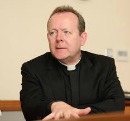All sides of opinion must be heard ahead of May’s referendum on same-sex marriage, Archbishop Eamon Martin has said.
Debate should be free, open and unhindered, the Catholic Primate of all Ireland told The Tablet. He said he was calling for a debate “free from insult or injury or hurt to any person whether they be people of a homosexual orientation or people of faith who would oppose change on the grounds that it is essentially redefining marriage”.
“We believe we have something to say on the issue of marriage and we would like to be able to say it and to say it freely in the public square,” the Archbishop said.
Speaking in Armagh, Dr Martin said the Church would like to be able to explain and share the good news about marriage as a relationship between a man and a woman, open to the bearing of children.
He added that it was a prophetic message in today’s “hyper-sexualised world” though he also recognised that it was a message that would not be wholly acceptable to a lot of people. But he said it must still be heard for the common good, and the good of children and society.
His statement follows the launch last month of a pastoral statement from the Irish Catholic Bishops, outlining and explaining the Church’s vision of marriage called ‘The Meaning of Marriage’.
In the pastoral statement, the bishops acknowledge that those who call for legal recognition of same-sex marriage see it as a matter of fairness, equality and civil rights.
But they explain, “The Church holds that basic human rights must be afforded to all people. This can and should be done without sacrificing the institution of marriage and family and the fundamental role they play in society.”
Asked about inheritance and hospital visitation rights, Bishop Kevin Doran of Elphin said the reality is that there are couples in Irish society who live in long-term committed relationships who are not necessarily married. He said these had to be catered for but not at the expense of marriage.
















